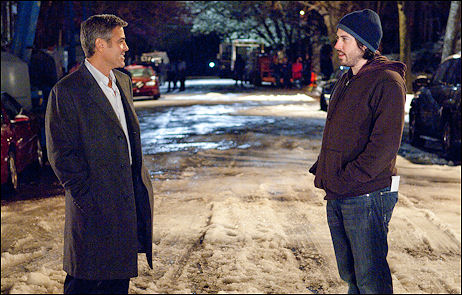As a reader of Walter Kirn‘s “Up In The Air“, Matthew Morettini suspects that Jason Reitman shot Up In the Air with an undercurrent of fatality in mind — i.e., George Clooney‘s Ryan Bingham suspecting his days may be numbered.
Those who haven’t seen the film should know that spoilers follow.
“Kirn’s 2001 novel is told in the first-person from Bingham’s point-of-view,” Morettini begins. “By the time we reach the third act, after a series of strange and confusing episodes, it becomes clear that Bingham is an unreliable narrator. It is only in the last few pages that we learn he has been suffering from seizures, black-outs for hours on end, and has an upcoming appointment at the Mayo clinic for treatment of this unnamed affliction.
“In short the book has a twist ending that makes you go back and rethink everything you read. I think director-cowriter Reitman had the same ending in mind when he made the movie only to pull his punches in post.
“The first clue to Reitman’s intention is the ‘Would you like the cancer?/Would you like the can, sir?’ joke during Bingham’s maiden flight. When I saw this scene, I immediately knew the meaning of the signal since I’d read the book. My presumption was that unlike Kirn in the novel, Reitman was going to be a bit more clever about planting clues about Bingham’s health throughout the story.
“As it stands in the film now, without the twist, the ‘cancer/can, sir’ joke is an odd bit that doesn’t really make sense. It’s merely a joke that seems to have been written to demonstrate Bingham is preoccupied with thoughts of cancer and death.
“There are other hints of mortality. If you go back and watch the movie again in your mind, almost everything else Bingham does makes more sense if we suspects he may be dying.
“As in the novel, Bingham is obsessed with frequent flier miles. (One million in the book, ten million in the film) “I would be number seven,” he explains. “More people have gone to the moon.” If we look at his quest through a mortal lens, we see that instead of just being a guy trying to score points, Bingham is someone racing the clock, trying to achieve something that would give his life a kind of meaning before he meets his early end.

George Clooney, Jason Reitman
“Bingham’s rash decision to throw away his whole life/relationship philosophy as he tries to connect with Alex in Chicago is something a sick guy with emotional avoidance issues might just do.
“Ditto his reaching out to reconnect with his family in northern Wisconsin, however awkwardly, and his trip down memory lane when he and Alex break into his old high school. Not to mention his ‘we all die alone’ declaration whenever he discusses relationships with Natalie.
“My gut tells me that Reitman watched his movie from start to finish and decided the ending was dark enough without piling a cancer diagnosis upon his main character.
“I’m not arguing that movie needed the twist; it works brilliantly without it. But the threads of this lost ending are woven through the film, and I do think it was there at the start. I think the whole story was started down that path and I think Clooney played the character as a goner, and that Reitman had second thoughts in post.
Sidenote: Morettini says that when Bingham tells his boss (Jason Bateman) that he doesn’t remember a bridge-jump suicide threat of one of the women Natalie laid off, “it didn’t read to me that he was protecting Natalie…it seemed to me he that he just forgot about the incident altogether.” That’s obviously not true. Bingham had forgotten nothing. He was protecting Natalie. And himself, of course.












